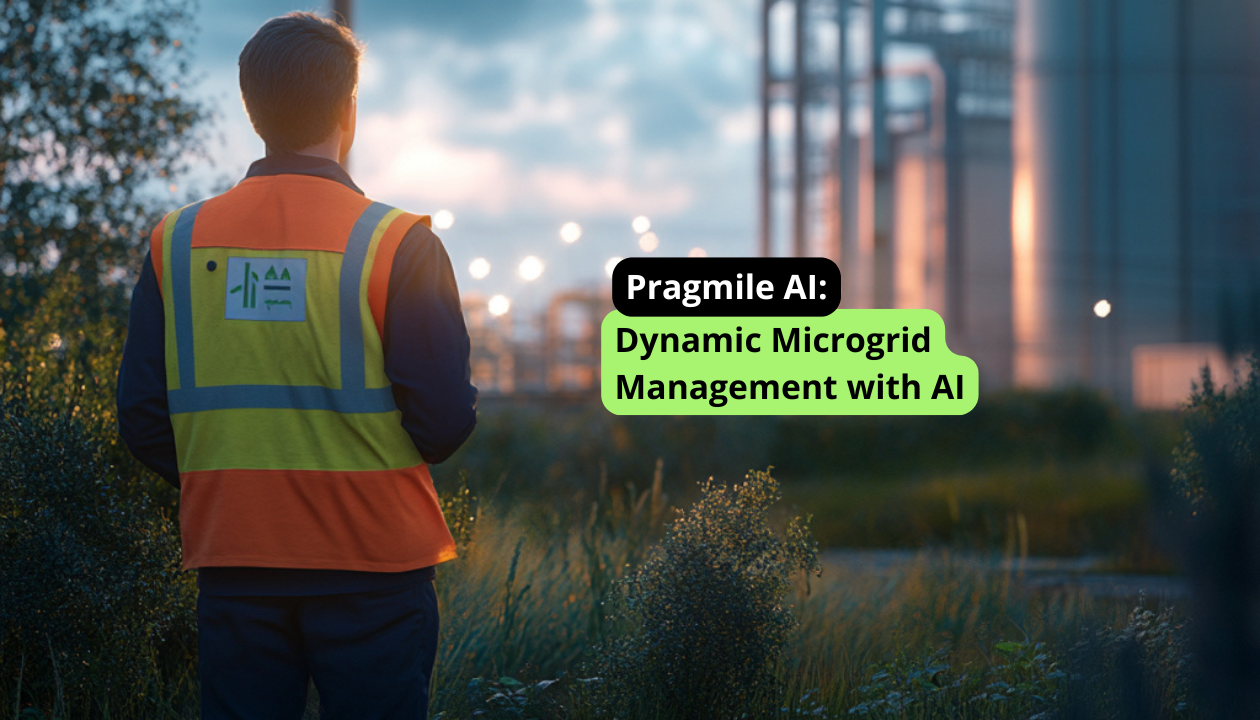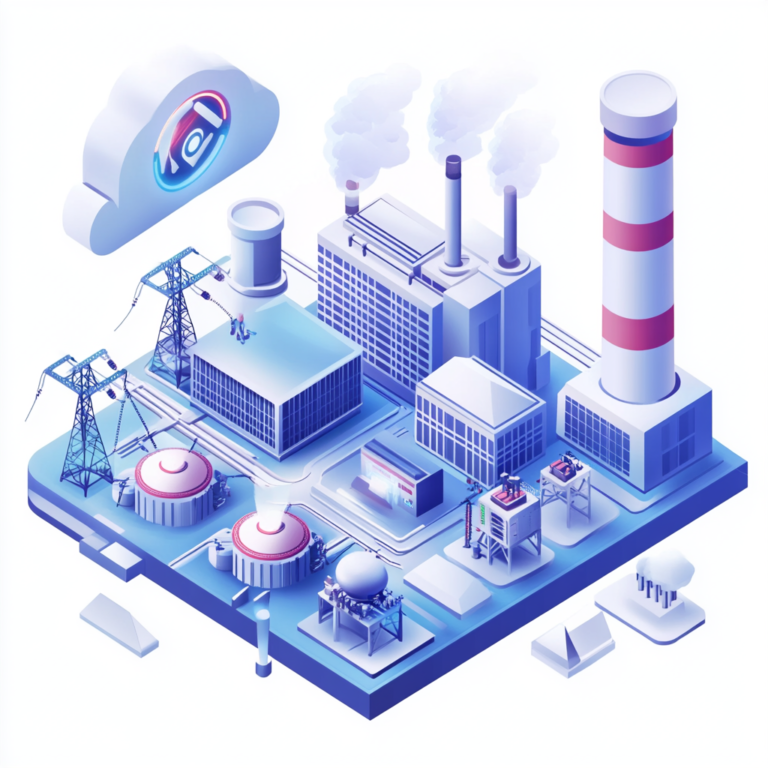
Published: 23 October 2024
Dynamic Microgrid Management with AI
The energy industry is no longer based only on central power systems. With the dynamic development of micro-grids and renewable energy sources, there is a need for advanced, flexible management of these complex systems.
Artificial intelligence (AI) is helpful in this case, which can optimize energy distribution, predict demand and integrate renewable energy sources thanks to the ability to analyze huge amounts of data in real time. Such solutions are no longer the future – they are the present, revolutionizing the way energy is managed at a local and global level.
What Are Microgrids and Why Are They So Important?
The complexity of modern energy systems requires innovative solutions. Traditional, centralized energy grids, although they have served their purpose for years, are increasingly proving to be insufficient. Changing climatic conditions, growing energy demand and technological progress force the search for more flexible and effective solutions. One such response to the challenges of modern energy industry is microgrids.
Microgrids are local, self-sufficient energy grids that can function both as part of a larger energy grid and in autonomous mode. They combine various energy sources, such as solar panels, wind turbines, and energy storage systems. They are used in various sectors, from industry to local communities, where they provide energy independence and increase resilience to failures. In 2023, the global microgrid market was valued at $9.88 billion and is expected to grow from $11.24 billion in 2024 to $37.35 billion by 2032.
Microgrids are characterized by flexibility in managing various energy sources, including renewable energy sources such as solar and wind energy. They allow for the decentralization of energy production and better adjustment to local needs, which is particularly important in the context of changing energy demand and the growing emphasis on sustainable development. However, the challenge associated with microgrids is dynamic management, which requires monitoring, forecasting demand and supply, as well as effective integration of renewable energy sources. Traditional energy management systems are often not sufficient to meet these challenges. This is where artificial intelligence comes in, enabling dynamic, precise and optimal energy management.

Artificial Intelligence in Microgrid Management
Energy management systems are key to the efficient operation of microgrids. Smart energy management systems use advanced algorithms to monitor and control energy flow.
Artificial intelligence in microgrids acts as an advanced tool that supports smart energy management systems. AI analyzes huge amounts of data in real time, enabling the optimization of microgrid operation, increasing its efficiency and reliability, and reducing costs.
Using numerous sensors distributed throughout the grid, AI systems collect data on renewable energy production, energy consumption by customers, battery status, and other parameters. This data is then processed using advanced machine learning algorithms.
-
- Machine learning algorithms enable AI systems to do the following:
- Pattern Recognition – by analyzing historical data, artificial intelligence can detect recurring patterns in energy production and consumption, allowing for more accurate forecasting of future demand.
- Production Optimization – AI can adjust renewable energy production to current demand, minimizing energy losses.
- Energy Storage Management – artificial intelligence can optimize battery charging and discharging, ensuring energy is available during periods of peak demand.
- Anomaly Detection – AI algorithms can quickly detect any anomalies in the microgrid’s operation, such as equipment failures or changes in power quality.
- Real-Time Decision Making – based on analyzed data, AI can make autonomous decisions regarding microgrid management, such as switching loads, changing the grid configuration, or activating emergency systems.
One of the key applications of artificial intelligence in microgrid management is forecasting. Based on historical data and weather information, AI can predict renewable energy production and energy demand in the coming hours or days with high accuracy. This allows for optimizing the operation of the microgrid, minimizing the need to purchase energy from the external grid.
Another important application of artificial intelligence is energy storage management. AI algorithms can determine the optimal battery charge level, taking into account energy production and consumption forecasts, energy costs, and other factors. Thanks to this, the potential of the energy storage can be maximally used, increasing the independence of the microgrid.
There are many microgrid software solutions available on the market that use the latest technologies to manage energy production and distribution. Examples such as Siemens’ Spectrum Power Microgrid Management System, Eaton’s Power Xpert Microgrid Solutions, Schneider Electric’s EcoStruxure™ Microgrid Advisor, and Cat® Hybrid Energy Solutions include platforms for monitoring the condition of the grid, controlling assets, and controlling the entire system, including optimization and automation capabilities.

Smart Energy Management – Benefits of Using AI in Microgrids
The use of artificial intelligence in microgrids brings a number of benefits, both at the operational and economic levels. First of all, AI enables dynamic management, which means that systems can respond to changes in energy demand immediately. This allows avoiding situations in which there are energy shortages or overproduction, which in both cases lead to losses.
The use of artificial intelligence in microgrids also supports increasing system stability. AI algorithms monitor the system in real time, identifying potential threats such as overloads or failures, and take preventive actions before the problem occurs. This allows microgrids to operate more reliably, even in difficult conditions.
Another key advantage of using AI in microgrids is the optimization of operating costs. Automation of many processes, such as load management, energy balancing or forecasting production from renewable energy sources, reduces the need for human intervention and lowers the costs associated with operational errors. Artificial intelligence can also help better manage energy storage, reducing the costs of operating expensive backup energy sources during peak hours.
The use of AI in microgrids can also increase its profitability. An example is the Renewable Energy Integration Demonstrator Singapore (REIDS) initiative at Nanyang Technological University, which supports research and development in the energy sector, especially related to renewable energy and microgrids. The project implemented the AI-based Metron solution, whose main goal is to make microgrids more profitable. It uses multiple data sources from industrial and other systems, such as weather, connecting with energy markets to provide energy efficiency and real-time savings. The data collected by AI is intended to maximize revenue from the sale of generated energy. The solution also monitors different types of energy collected, such as solar, wind and diesel.
Microgrids often work with central power grids, which poses challenges in terms of synchronizing production, distribution and power balancing. AI enables better integration of microgrids with the main grid, dynamically responding to changing demand and fluctuations in supply from central energy sources. This ability supports grid stability, reduces load and prevents overloads.
Dynamic management of microgrids using artificial intelligence is a key step towards sustainable energy development. With intelligent energy management systems, it is possible not only to increase operational efficiency, but also to improve the reliability of energy supply.
If you want to delve deeper into this topic and find out how AI can support your company’s operations, schedule a free consultation with Marcin Jabłonowski – Managing Director and AI Solutions Architect at Pragmile. We have already completed many successful implementations, such as the Solar Spy platform based on artificial intelligence for comprehensive management of photovoltaic farms.
Schedule a free consultation with
our AI and technology experts
Take advantage of the latest AI solutions, tailored to your company's needs. Book a consultation with AI solution architects at Pragmile and discover new opportunities in energy management.
Please, provide your business email to schedule a meeting


